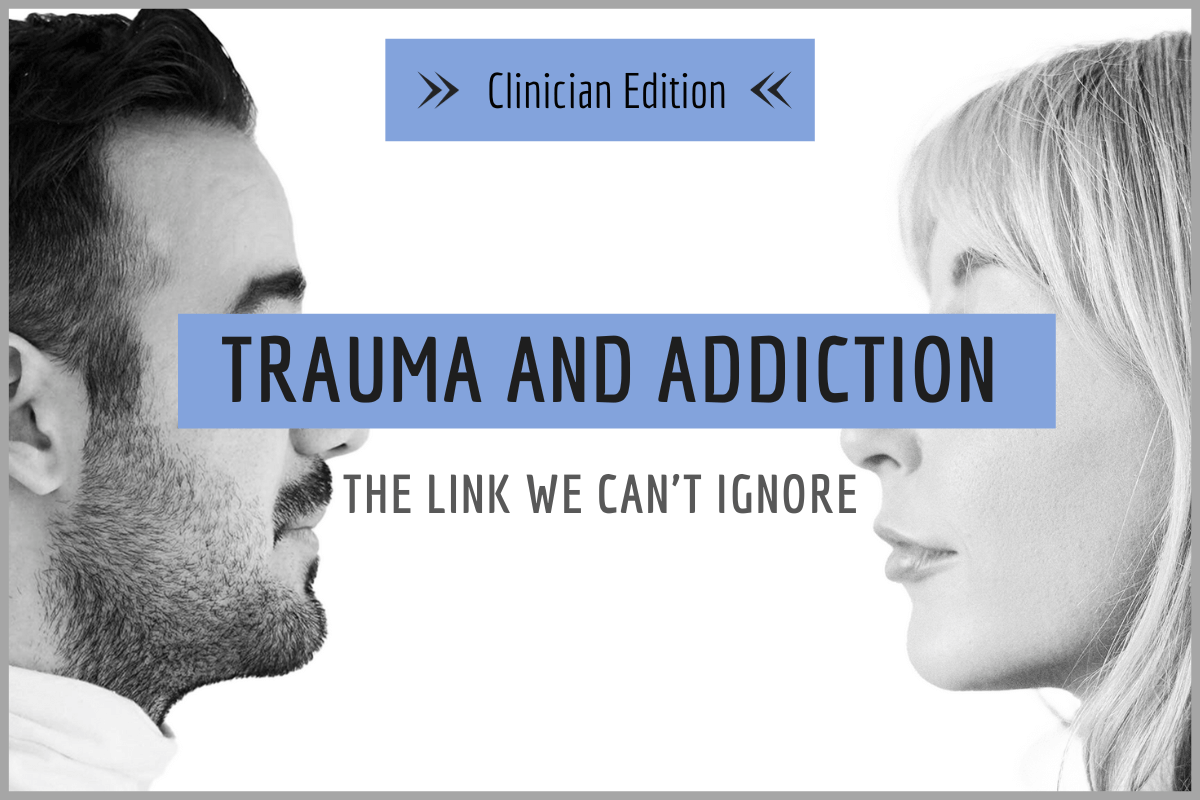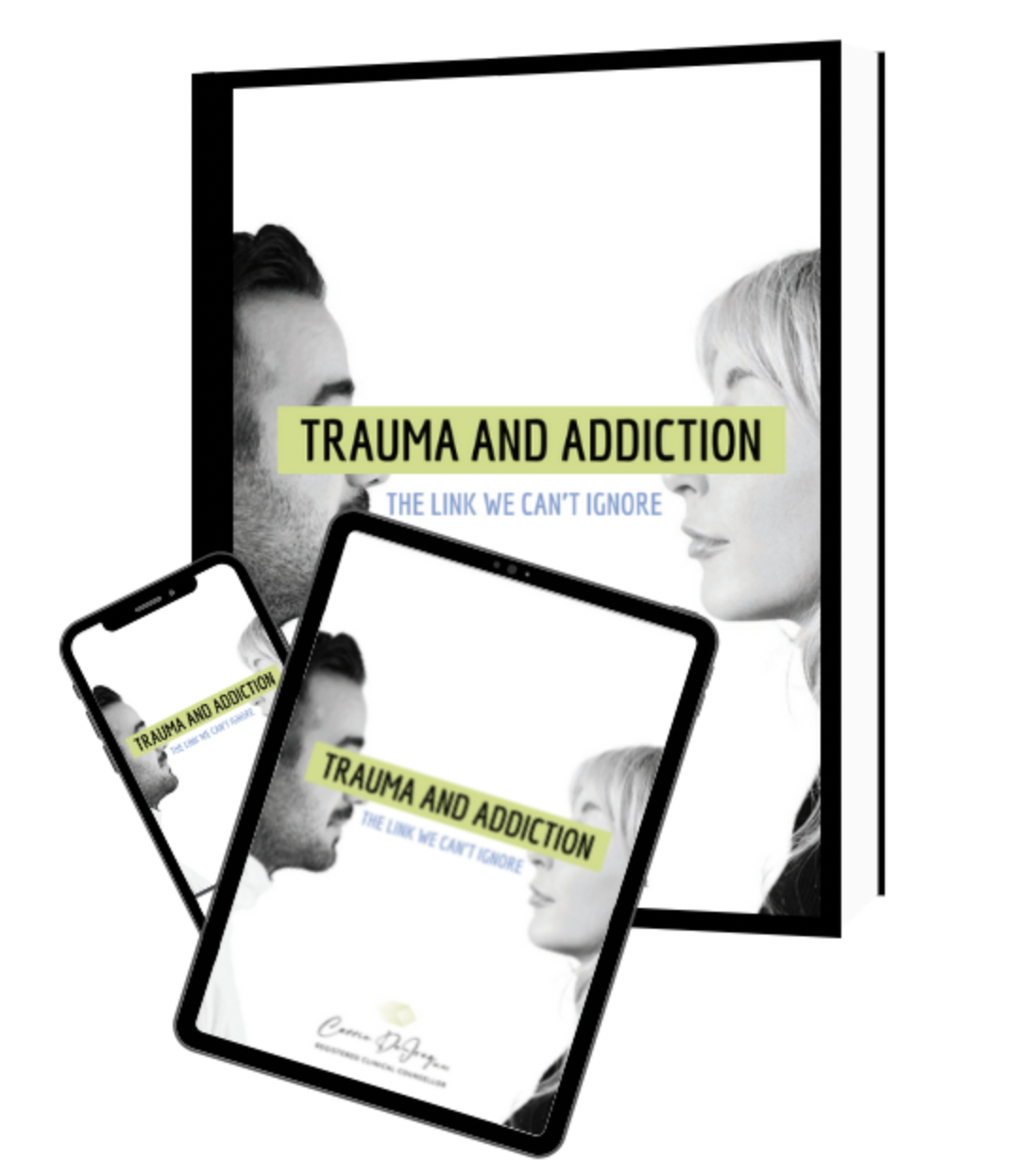What Happens When Addiction Treatment Doesn’t Address Trauma? (Clinician Edition)
As addiction recovery and mental health professionals, we all want to be helpful to people pursuing recovery from addiction. One of the ways we can be most beneficial is to pay attention to how often trauma is both an unspoken and unacknowledged experience for many of them. Unfortunately, the consequence of missing this vital connection adds to the struggle for those who are stuck in addictive patterns.
We all understand the increased risk of trauma for heavy substance users, including accidents and injuries, exposure to violence and sexual trauma, and substance-related illnesses. Additionally, people struggling with addiction also experience more traumatic losses.
While the high risks associated with substance use can be a source of trauma, most people who experience both trauma symptoms and substance dependence were exposed to significant adverse experiences long before their misuse of substances began.
Trauma symptoms differ significantly from person to person, but common trauma symptoms include increased anxiety, fear, anger, and shame. Some people experience insomnia, nightmares, mood swings, agitation, or difficulty concentrating following a traumatic experience. Sometimes a person remains on "high alert" following traumatic experiences or can be jumpy and easily startled. A person might feel more disconnected from themselves or others. There may also be particular situations or places that trigger extreme emotional reactions.
It is far too easy to mistake some of the common symptoms of unresolved trauma for the negative consequences of substance use.
Those experiencing addiction are often anxious, have difficulty managing their emotions, and tend to be impulsive. In addition, complaints such as insomnia are frequent. But it is not helpful if we only attribute these experiences to a person's use of substances or the chaos of life in addiction.
When we miss the connection between trauma and substance use, we risk seeing their struggles as resulting from their own choices and behaviours. When that happens, we will fail to provide the resources they need to deal with the underlying impacts of trauma. The process of recovery is already fraught with enough challenges.
7 IMPACTS OF MISSING THE LINK BETWEEN TRAUMA AND ADDICTION
Clients may face seven additional challenges clients may face as they seek help for addiction disorders if their history of trauma is not adequately identified or addressed as part of their treatment plan.
1. Too much of a focus on addiction leaves the initial issue of trauma unresolved.
Trauma symptoms disrupt everyday life. So it should not be surprising that someone who experiences normal reactions to trauma seeks relief from these painful symptoms. And it should not be surprising that substance use or other forms of mood-altering becomes a way of pursuing that relief. Initially, mood-altering substances or behaviours may have helped medicate painful feelings. They may have been a way of avoiding difficult memories or circumstances. The problem with self-medicating as a way of managing trauma symptoms is that it leads to out-of-control patterns while still leaving the initial issue of trauma unresolved.
Although substances may provide a temporary "fix" for the experience of trauma symptoms, their use only adds to the trauma symptoms and can make the symptoms worse. Besides making trauma symptoms worse, chronic mood-altering interferes with the ability to work through traumatic experiences compounding the ongoing struggle of trauma.(1)
People with both trauma and substance use disorders report both symptoms of either worsening together or improving together. If trauma symptoms improve, there is an improvement in substance use patterns. If trauma symptoms worsen, more substances get consumed. This reality demonstrates the vicious cycle between these two struggles where one problem feeds the other.(2)
Research shows that when a person has help dealing with their trauma symptoms, it has a more significant positive impact on their substance use disorder than the other way around – addiction treatment makes less of a positive impact on trauma symptoms.(3)
Although we need to treat both problems, we often emphasize treating addiction without working to lessen the negative impact of unresolved trauma.
2. People with a history of trauma and addiction have more significant substance use problems.
Clinical studies of those who have both PTSD and substance use disorders (SUD) clearly show they have more challenges than those who experience only PTSD or only a SUD. Drug or alcohol problems increase significantly for those who have both. Studies show they started using these substances at an earlier age – it is not uncommon for those who experienced trauma childhood trauma to begin regularly using alcohol or marijuana by age 11 or 12.(3)
Trauma also sets up people to have more years of problematic substance use since it tends to be used as a coping mechanism rather than for social reasons. As a result, trauma survivors with a SUD also tend to use a greater number of substances and use more of these substances. In addition, they often experience more intense cravings (4), especially if those cravings are directly related to underlying trauma symptoms such as intrusive memories, fear, shame, anger, or other trauma triggers.
Trauma sets people up to engage in far more destructive patterns of substance use, and the consequences of that use also tend to be far more significant.
3. They also have increased mental health issues.
The co-occurrence of a SUD and trauma creates more dangerous addiction problems and leads to more problematic mental health concerns. While we understand the link between trauma and poorer mental health functioning, those with traumatic life experiences as well as substance use struggle far more with anxiety, depression, suicidal thoughts, and other self-destructive behaviours.(3)
Clinical studies show that individuals with PTSD and alcohol dependence are twice as likely to report a history of suicidal ideation than those who have PTSD but without a SUD. They are also six times more likely to have attempted suicide.(5) Other research demonstrates that those who are substance-addicted are up to 9 times more likely to have a psychiatric disorder if abused as children than those who were not.
The complexities of co-occurring addiction and mental health issues are exacerbated for those with a history of trauma.
4. Addiction treatment programs are less helpful.
Although co-existing PTSD and trauma is a common issue for many of those seeking treatment for a SUD, most addiction treatment centres do not adequately identify or treat trauma symptoms. This unfortunate reality negatively impacts the success of a treatment program. In addition, getting the support and help needed to deal with substance dependence and trauma is challenging. If both issues are not recognized and addressed simultaneously, treatment is often not as helpful, and the chance of recovery is poorer.
Trauma symptoms often interfere with the ability to experience the full benefit of treatment for SUD. (3) Some of these trauma symptoms include high levels of anxiety and panic, nightmares, difficulty feeling safe in groups, feeling overwhelmed in new situations, fears of giving up control, easily triggered emotions of fear, shame, or anger, as well as patterns of withdrawing or shutting down when overwhelmed.
Many common trauma symptoms make it difficult to participate fully in a treatment program.
5. Trauma symptoms are often mistaken for resistance.
Counsellors must recognize trauma symptoms for what they are. People with a history of trauma can find many aspects of traditional substance use treatment programs problematic. For example, they may find confrontational approaches frightening. They may respond to being challenged with defensiveness and anger. Or they may become reactive when they perceive they are being "controlled". However, when we look at these behaviours through the lens of trauma, we can understand these reactions are "normal" reactions to the loss of control they experienced in their previous traumatic experiences.
But if we view a client's reaction as resistance or unwillingness, they are less likely to receive the support that helps them move forward. Instead of compassion and understanding, they often feel shame and judgment.
Too often, we dismiss traumatized clients as being not "ready" or not "willing" to move forward in dealing with their substance abuse issues.
6. Relapse occurs more often for those with unresolved trauma.
Even when there is a strong desire to stop destructive patterns of substance use, unresolved trauma often leads to a greater likelihood of a quick relapse following the completion of a treatment program.(3) Although some believe that trauma treatment should not occur until a person has achieved a period of abstinence out of fear that trauma treatment might trigger a relapse, it is clear that those who have both trauma and addiction issues struggle to maintain sobriety.
Many substance-addicted individuals genuinely desire to stop misusing drugs or alcohol. But unfortunately, trauma symptoms often increase when attempting abstinence because substances are no longer being used to numb trauma symptoms – there can be a dramatic increase in intrusive memories or reactions to trauma-related reminders. A sudden rise in troublesome symptoms when abstinent can trigger an overwhelming desire to mood alter.
Abstinence may not diminish trauma symptoms - it may trigger them.
7. It increases the hopelessness about the possibility of recovery.
A vicious cycle occurs for many substance-dependent individuals who have experienced the effects of past trauma. First, a sincere attempt at abstinence occurs, followed by increased trauma symptoms such as emotional triggers or intrusive memories. This increase in trauma symptoms then triggers a relapse. Finally, there is greater shame, guilt and hopelessness, making the next attempt at recovery even more challenging.
When the underlying trauma remains unidentified or resolved, it makes the process of addiction recovery seem an impossible task.
I encourage clinicians and mental health professionals to become more "trauma-informed". This term refers to implementing principles of care that include: creating safety, being trustworthy, offering choice and collaboration, empowerment, and respect for diversity. Trauma-informed care recognizes these principles are foundational when supporting people in recovery from addiction.
Secondly, I encourage clinicians who provide addiction treatment to offer more programs that provide education and tools to create the safety needed to heal from trauma.
Thank you for taking time to learn about helpful ways to support clients seeking recovery from trauma and substance use disorders.
You might also find these resources helpful:
This extensive article is written specifically for clinicians and mental health professionals.
Carrie DeJong’s free eBook written for general audiences.
References:
1 Stewart, S. H., R. O. Pihl, P. J. Conrod, and M. Dongier. "Functional Associations Among Trauma, PTSD, And Substance-related Disorders." Addictive Behaviors 23.6 (1998): 797-812.
2 Ouimette, P., R. H. Moos, and P. Brown. "Substance Use Disorder-posttraumatic Stress Disorder Comorbidity: A Survey of Treatments and Proposed Practice Guidelines." Trauma and Substance Abuse: Causes, Consequences, and Treatment of Comorbid Disorders. Washington, DC: American Psychological Association, 2003. 91-110.
3 Schäfer, I., and L. M. Najavits. "Clinical Challenges In The Treatment Of Patients With Posttraumatic Stress Disorder And Substance Abuse." Current Opinion in Psychiatry 20.6 (2007): 614-18.
4 Berenz, E. C., and S. F. Coffey. "Treatment of Co-occurring Posttraumatic Stress Disorder and Substance Use Disorders." Current Psychiatry Reports (2012): 469-77.
5 Rojas, S. M., S. Bujarski, K. A. Babson, C. E. Dutton, and M. T. Feldner. "Understanding PTSD Comorbidity and Suicidal Behavior: Associations among Histories of Alcohol Dependence, Major Depressive Disorder, and Suicidal Ideation and Attempts." Journal of Anxiety Disorders 28 (2014). 318-25



